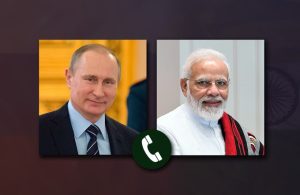USA to slap crippling sanctions on Russia over nerve agent attack in Britain
USA to slap crippling sanctions on Russia over nerve agent attack in Britain

WASHINGTON/LONDON: The The United States of America (USA) today said it will impose tough new sanctions on Russia after determining that Moscow used a deadly military-grade nerve agent to kill a former Russian double agent and his daughter in the UK.nnSergei Skripal, a former Russian spy, and his daughter Yulia Skripal were hospitalised and treated for a nerve agent attack in March. While Yulia was discharged from a British hospital in April, her father recovered and left the hospital in May.nnThe State Department said in a statement that the sanctions were in response to the use of a ‘Novichok’ nerve agent in an attempt to assassinate UK citizen and his daughter on March 4.nnRussia has rejected allegations levelled by the UK that it was behind the deadly nerve-agent attack in the English city of Salisbury.nnThe US, on August 6, determined that the Russian government “has used chemical or biological weapons in violation of international law or has used lethal chemical or biological weapons against its own nationals,” State Department spokeswoman Heather Nauert said.nnThe statement said that following a 15-day Congressional notification period, these sanctions will take effect around August 22.nnThe State Department notified Congress yesterday of the first of two potential tranches of sanctions required under the 1991 law. Unless Russia takes certain steps, a second set of penalties — more stringent than this first round — must follow, according to the law.nnThe first set of sanctions targets certain items the US exports to Russia that could have military uses — so-called dual use technologies. These are sensitive goods that normally would go through a case-by-case review before they are exported. With these sanctions, the exports will be presumptively denied, CNN reported.nnThe sanctions are mandated under the Chemical and Biological Weapons and Warfare Elimination Act of 1991.nnRelations between Russia and the West hit a new low after the nerve agent attack in the UK. More than 20 countries expelled Russian envoys in solidarity with the UK.nnThe Washington Post quoted a State Department official as saying that the sanctions could have a significant impact on trade with Russia, including prohibition of licenses on sending some US goods there, such as electronic devices.nn”But unless Russia agrees within 90 days to stop all use of chemical weapons and permit inspections to confirm their elimination, additionally mandated measures could cut off almost all trade between the two countries, prohibit landing rights for Russian airlines, and lead to a suspension of diplomatic relations,” the Post report said.nnIn March, the Trump administration had ordered the expulsion of 60 Russians from the US, following similar actions taken by other countries in the wake of the allegation by the UK that Russia was behind the nerve agent attack.nnOf the 60 expelled, 12 are intelligence operatives from the Russian mission to the United Nations who have been accused of abusing their privilege of residence in the United States.nn”After a review, we have determined that the 12 intelligence operatives engaged in espionage activities that are adverse to our national security. Our actions are consistent with the UN Headquarters Agreement,” US Ambassador to the UN Nikki Haley had said.nnRussia had responded with a similar number of diplomatic expulsions and ordered the closure of the US consulate in St. Petersburg, Russia’s second-largest city.nnBritain welcomed the move from the US. In a short statement, a government spokesperson said, “The strong international response to the use of a chemical weapon on the streets of Salisbury sends an unequivocal message to Russia that its provocative, reckless behaviour will not go unchallenged.”nnThe Russian embassy in the US hit back today, criticising what it called “far-fetched accusations” from the US that Russia was behind the attack.nnRussia had become “accustomed to not hearing any facts or evidence”, it said, adding: “We continue to strongly stand for an open and transparent investigation of the crime committed in Salisbury.nnSource: Press Trust of India






